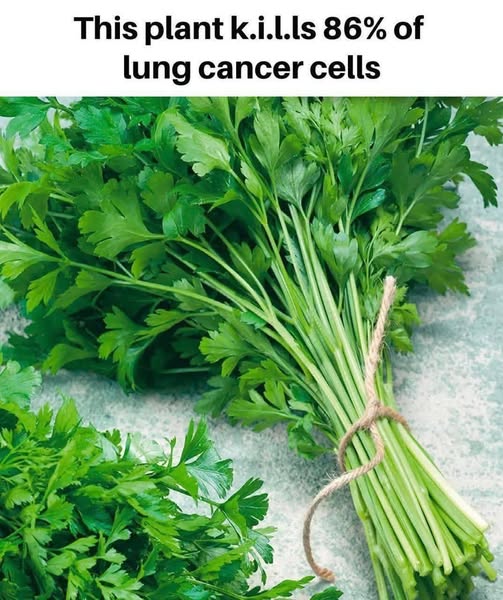This Plant Destroys Up to 86% of Lung Cancer Cells – Backed by Science
Lung cancer is one of the most devastating diseases globally, accounting for more deaths each year than breast, colon, and pancreatic cancers combined. Among its most common forms, non-small cell lung cancer (NSCLC) represents approximately 75% to 80% of all cases. With such a dire prognosis, the demand for natural, supportive interventions alongside traditional treatments has surged.
Recent studies have brought parsley—a common culinary herb—into the spotlight, thanks to its rich content of a powerful plant compound called apigenin. Research suggests that apigenin may destroy up to 86% of lung cancer cells, offering promising hope for complementary cancer support.
The Power of Parsley: Nature’s Chemotherapy Ally
Parsley (Petroselinum crispum) has long been used for culinary and medicinal purposes. However, only recently have scientists begun to explore its chemopreventive potential, especially in the context of aggressive cancers like NSCLC.
What Makes Parsley So Potent?
The secret lies in a natural flavonoid called apigenin. This bioactive compound is widely known for its:
- Anti-carcinogenic
- Anti-inflammatory
- Antioxidant
- Anti-angiogenic properties
Apigenin’s Effect on Lung Cancer Cells
In a notable PubMed-indexed study, researchers found that apigenin could inhibit up to 86% of lung cancer cells in controlled environments. These cancer cells were shown to undergo:
- Apoptosis (programmed cell death)
- Inhibited proliferation
- Reduced angiogenesis (cutting off blood supply to tumors)
Apigenin achieves this by interfering with pathways cancer cells rely on for growth, such as the PI3K/Akt and NF-κB signaling pathways. These pathways are notorious for driving cancer cell survival, metastasis, and resistance to drugs.
Top Dietary Sources of Apigenin
While parsley is the highest known source of apigenin, it is also found in several other common foods and herbs, allowing for a diet-based approach to support health and prevention.
1. Parsley (Fresh and Dried)
- Highest concentration of apigenin
- Add raw to salads, smoothies, or steep as tea
2. Celery
- Contains both apigenin and luteolin
- Best consumed raw for maximum bioavailability
3. Chamomile Tea
- Rich in apigenin
- Also promotes relaxation and improves sleep
4. Oranges and Citrus Fruits
- Contain moderate amounts of apigenin
- Packed with immune-supporting vitamin C
5. Onions and Garlic
- Support detoxification pathways
- Offer anti-inflammatory and antioxidant compounds
6. Oregano and Cilantro
- Fresh herbs rich in flavonoids
- Easy to incorporate into a Mediterranean-style diet
7. Artichokes
- Contains multiple polyphenols including apigenin
- Supports liver health and detox processes
8. Red Wine (in moderation)
- Contains apigenin and resveratrol
- Associated with improved cardiovascular health
How to Maximize Apigenin Absorption
To get the most out of apigenin-rich foods, follow these strategies:
- Consume raw parsley or make fresh parsley juice
- Combine apigenin-rich foods with healthy fats (e.g., olive oil) to enhance absorption
- Avoid overcooking—heat can degrade delicate flavonoids
- Drink chamomile tea daily, especially before bed
- Consider concentrated apigenin supplements (under medical supervision)
Scientific Support: What the Research Says
A growing body of research backs the anti-cancer potential of apigenin:
- Journal of Cancer Prevention reported that apigenin induced cell cycle arrest and apoptosis in lung cancer cells.
- International Journal of Oncology highlighted apigenin’s ability to suppress tumor growth in animal models.
- Frontiers in Pharmacology emphasized apigenin’s role in sensitizing tumors to chemotherapy, potentially making conventional treatments more effective.
These findings point toward apigenin not as a standalone cure, but as a valuable adjunct in integrative cancer care.
Can Apigenin Replace Traditional Lung Cancer Treatments?
No. While apigenin shows promise, it is not a substitute for chemotherapy, radiation, or immunotherapy. It should be viewed as a complementary approach, potentially helping:
- Enhance treatment efficacy
- Reduce side effects
- Improve overall outcomes
- Support immune health during therapy
Always consult with your oncologist before introducing herbal or nutritional therapies into your treatment plan.
Daily Anti-Cancer Protocol (Using Apigenin-Rich Foods)
If you’re looking to integrate apigenin-rich foods into your routine, here’s a sample daily anti-inflammatory, anti-cancer support plan:
Morning:
- Warm lemon water
- Green smoothie with parsley, celery, cucumber, and green apple
- 1 boiled egg with a slice of avocado
Lunch:
- Mixed greens salad with parsley, red onions, and olive oil dressing
- Grilled salmon or tofu
- Chamomile tea
Afternoon Snack:
- Orange slices or citrus fruit
- A handful of walnuts
Dinner:
- Steamed artichokes with lemon and herbs
- Quinoa with sautéed garlic, onions, and oregano
- Glass of red wine (optional)
Before Bed:
- Cup of chamomile tea
This approach ensures regular intake of apigenin, while promoting overall cellular health, detoxification, and immune function.
The Future of Apigenin in Cancer Research
The anticancer properties of apigenin are being explored not only for lung cancer but also for:
- Breast cancer
- Colon cancer
- Prostate cancer
- Pancreatic cancer
Its ability to modulate multiple cancer-related pathways makes it a promising subject of ongoing clinical trials. Future research may pave the way for apigenin-based therapies, either as pharmaceutical agents or standardized nutraceuticals.
Conclusion: Harnessing Nature in the Fight Against Lung Cancer
Lung cancer remains one of the most feared and deadly forms of cancer, but nature may offer powerful allies. Apigenin, particularly abundant in parsley, has shown significant potential in killing up to 86% of lung cancer cells in scientific studies. While not a cure, it serves as a potent companion to medical treatment—helping to fortify the body, fight inflammation, and support recovery.
Integrating parsley and other apigenin-rich foods into your daily diet is a smart, research-backed step toward better health and cancer resilience.
